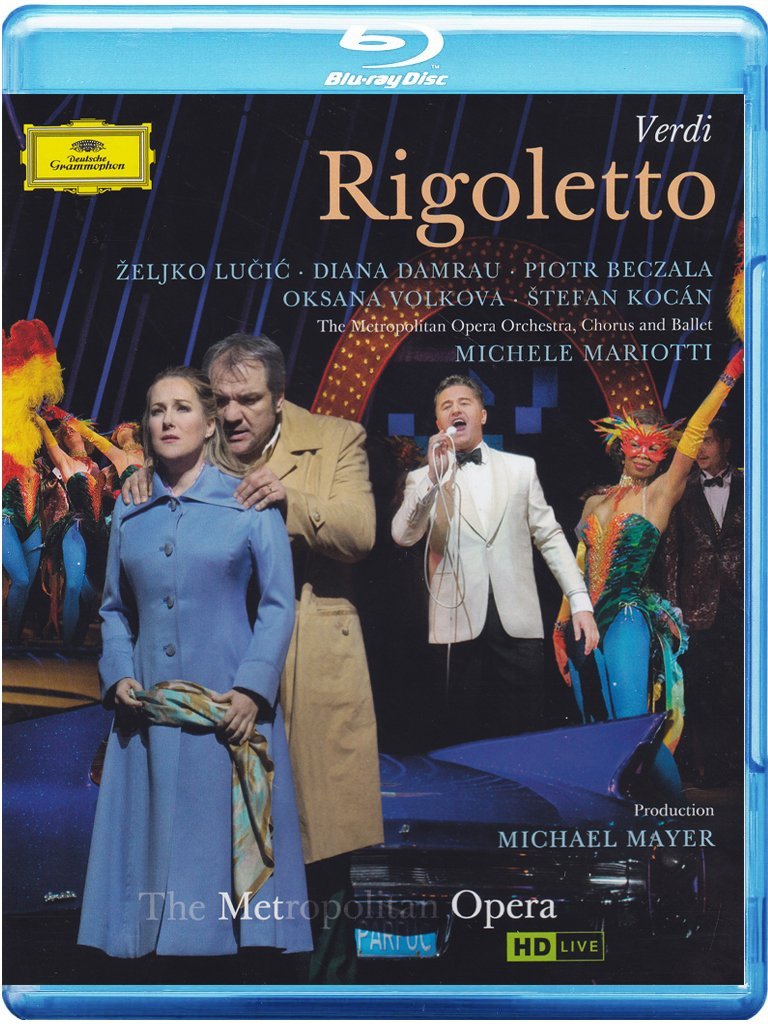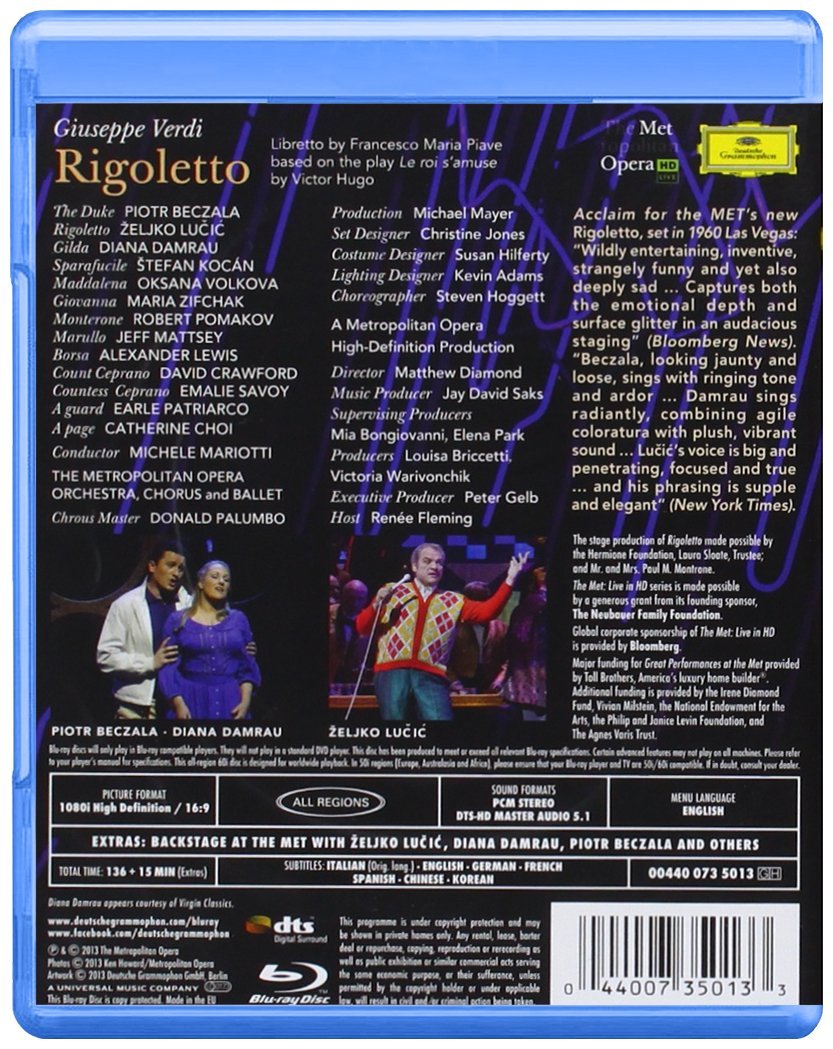

Verdi Rigoletto opera to libretto by Francesco Maria Piave. Directed 2013 by Michael Mayer at the Met. Stars Piotr Beczala (Duke), Željka Lučić (Rigoletto), Diana Damrau (Gilda), Štefan Kocán (Sparafucile), Oksana Volkova (Maddalena), Maria Zifchak (Giovanna), Robert Pomakov (Monterone), Jeff Mattsey (Marullo), Alexander Lewis (Borsa), David Crawford (Count Ceprano), Emalie Savoy (Countess Ceprano), Earle Patriarco (A Guard), and Catherine Choi (Page). Michele Mariotti conducts the Met Orchestra and Chorus (Chorus Master Donald Palumbo). Met Ballet choreographed by Steven Hoggett. Sets by Christine Jones; costumes by Susan Hilferty; lighting by Kevin Adams. The English subtitles in this production contribute enormously to its success; I think the credit for this should go to David Rebhun. Directed for TV by Matthew Diamond; music producer was Jay David Saks; Supervising Producers were Mia Bongiovanni and Elena Park; Producers were Louisa Briccetti and Victoria Warivonchik. Sung in Italian. Released 2013, disc has 5.1 dts-HD Master Audio sound. Grade: A+
This is the Met "Rat Pack" production that premiered January 2013. The realization of some of Verdi's characters are inspired by famous personalities in the US in the early 1960s, and this is covered briefly in one of the extras. All of the stars when interviewed say they sing for this updated show exactly the same as they sing in a traditional version. The music and libretto are unaltered. But for viewers in the US anyway, the Met does an amazingly good job of updating the setting of this opera by 400 years from a royal principality to modern times.
Las Vegas in 1960:
The Duke (Piotr Beczala) is a charismatic casino owner with ties to the American mafia. His connections to the mob provide a neat analog to the kind of power a Duke might have had in earlier centuries. At this point I should explain that the Met orchestra is one of the best opera bands in the world, and this title offers good proof of that. The orchestration is admirably beautiful and refined throughout. The balance between the orchestra and the singers seems always to be perfect so that the dialog is startlingly clear. Here we also have a fantastic set of star singers and actors with many productions of Rigoletto behind them. But I sense in this video that they are all excited about being in this zany new Met blowout.
Now read the subtitles in the image below. I don't have the Rigoletto score. But I'm pretty sure this English text bears little direct relationship to what Maria Piave wrote in 1850. The Met commissioned subtitles would make this production work, and the result is a big boost in entertainment value for the HT viewers. I can't think of any other opera HDVD where the English subtitles have been handled so well:
Rigoletto (Željka Lučić) is here created in the mold of Donald Rickles, the great American "insult comic" who went by the name of "Don." The word "Don" in many languages means "Lord." So here we have a Duke and a Lord consorting, all of which is forbidden by the United States Constitution, which proscribes titles of nobility in America. Further I note that in the subtitles below, Lord Rigoletto claims to be "untouchable." The title "untouchable" in American folklore is reserved for agents of the FBI and other government police units that suppressed mob activities in the United States in the 1930s. (I told you the subtitles here are great.) An insult comedian is one who gets laughs by being as obnoxious as possible to everyone else including the audience. This explains, of course, why the other members of the Duke's entourage hate Rigoletto:
Don Rickles:
Monterone (Robert Pomakov) curses Rigoletto. Making Monterone an Arab big shot was another stoke of genius. Few in the world in 1960 worried about being cursed. But who knows what an Arab billionaire might do if somebody messed with a daughter:
Below Sparafucile (Štefan Kocán). In the English subtitles, Sparafucile kills with a knife. (In German he uses a "messer" and in Spanish a "cuchillo", both of which mean knife. But in Italian he uses the original and out-dated "spada" or sword.)
Now we come to the trickiest task in updating Rigoletto—how to explain the strange, isolated condition of Gilda (Diana Damrau). Director Mayer neatly sidesteps all this by going completely abstract. We never learn anything objective about Gilda other than she lives nearby with a housekeeper and has a father who doesn't like to talk about the past. Mayer magically slips right into the only thing that matters: a young girl's first falling in love. This Damrau, age 42 at the time, had do all on her own like performing before a green screen. An you can see below, she rises to the challenge magnificently. First she is the perfect loving daughter:
And now the perfect virgin:
Her love duet with the Duke (disguised as a poor student) is unbelievable beautiful:
And now she is the perfect girlfriend singing an awesome 'Caro nome':
Finally, Mayer directs a perfect kidnapping. Rigoletto arrives in time to protect his daughter. But he gets tricked into going up the wrong elevator long enough for the rats to grab the girl:
Usually, in the aria below the Duke offers his "crown" to get his true love back, and this is jarring in an updated version. But here the Met subtitles are again right on target:
More cool American slang:
The guys thought Gilda was Rigoletto's mistress. But now the joke has backfired:
The original "Rat Pack" was a group of entertainers; these rats are not so engaging:
And this might not be an idle threat:
Gilda probably thinks that Duke sent the men to get her. But she doesn't care:
La donna è mobile:
Maddalena (Oksana Volkova):
The famous quartet with four completely different parts sung simultaneously by (from your left to right) a baritone (Rigoletto), a soprano (Gilda), a contralto (Maddalena), and a tenor (the Duke):
It's cuttin' time:
And Rigoletto gloats, but not for long:
This is distinctly the best Rigoletto we now have in HDVD (July 2016). I can't think of anything to criticize. I've made a lot of the slangy subtitles that fit the production so well. But on the other hand, if I wanted to learn a Verdi score in Italian, I would probably pick Rigoletto and this recording as a study guide because the diction of the singers is generally so clear above the music.
Here are two Met trailers:






















